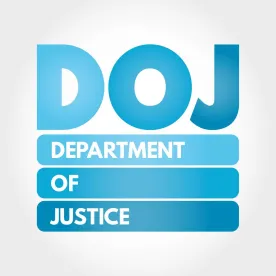The U.S. Department of Justice recently announced a new corporate voluntary self-disclosure (VSD) policy that sets forth a nationwide standard for when corporate misconduct is considered by the U.S. Attorney in each district to be self-disclosed. The new policy is designed to provide uniform standards and procedures for companies to timely disclose misconduct by their employees or agents to the DOJ in exchange for more lenient treatment from federal prosecutors.
The DOJ hopes the policy will provide transparency and predictability to companies concerning the benefits and potential outcomes in cases where companies voluntarily self-disclose misconduct. Ultimately, the new policy is intended to take the uncertainty out of self-reporting and incentivize companies to invest in effective compliance programs and to timely disclose corporate misconduct.
Under the new VSD policy, which is effective immediately, a company seeking leniency must make a “timely” voluntary self-disclosure to the U.S. Attorney’s Office before the relevant misconduct is publicly reported or otherwise known by the office. Furthermore, a company must disclose all relevant facts known to the company about the misconduct prior to an imminent threat of disclosure or a government investigation. The disclosure must be made promptly after the company becomes aware of the misconduct.
A self-disclosure under the new policy will require that the company include all relevant facts known at the time of disclosure concerning the misconduct. To the extent that a company is in the midst of an internal investigation, the expectation is that the company will provide factual updates as they become available. A company seeking leniency under the VSD program bears the burden of establishing that the disclosure is timely under the program and includes all the relevant facts known to the company.
In addition to making a timely self-disclosure, a company seeking leniency under the policy must also fully cooperate with the government’s investigation and implement appropriate remediation (including agreeing to pay all disgorgement, forfeiture and restitution resulting from the misconduct). The company must also move in a timely fashion to preserve, collect and produce relevant documents and information to the U.S. Attorney.
A company that voluntarily self-discloses and fully cooperates with the government can expect to receive significant benefits from the government. Absent aggravating factors, under the policy the U.S. Attorney will not seek a guilty plea from a company. Additionally, when the company meets the applicable standards, voluntary self-reporting may lead to no monetary penalty for the company or a fine no greater than half of the minimum fine suggested by the sentencing guidelines.
In cases where the company can demonstrate that it has implemented and tested an effective compliance program, the government will not seek the imposition of an independent compliance monitor. Even in cases where the U.S. Attorney determines that aggravating factors warrant a guilty plea, the self-reporting company may still receive other benefits, such as a reduction of at least 50 percent and up to 75 percent off the low end of the applicable fine.
Coming on the heels of the recently announced DOJ corporate enforcement and voluntary Self-Disclosure Policy in January 2023, the new VSD policy clearly signals DOJ’s commitment to encouraging a uniform self-disclosure policy across the country. Further, it is a strong statement from the DOJ to companies that moving forward an effective compliance program is a fundamental requirement for cooperation credit.
Both the timing requirements and the necessary factual disclosure point to the need for a high functioning compliance program. Companies will be required to demonstrate early detection of the criminal conduct as well as effective remediation. Ultimately, the clear signal from the DOJ is that companies can pay a little now to invest in effective compliance or pay a lot later if the DOJ comes knocking before the company has identified the problem.





 />i
/>i

